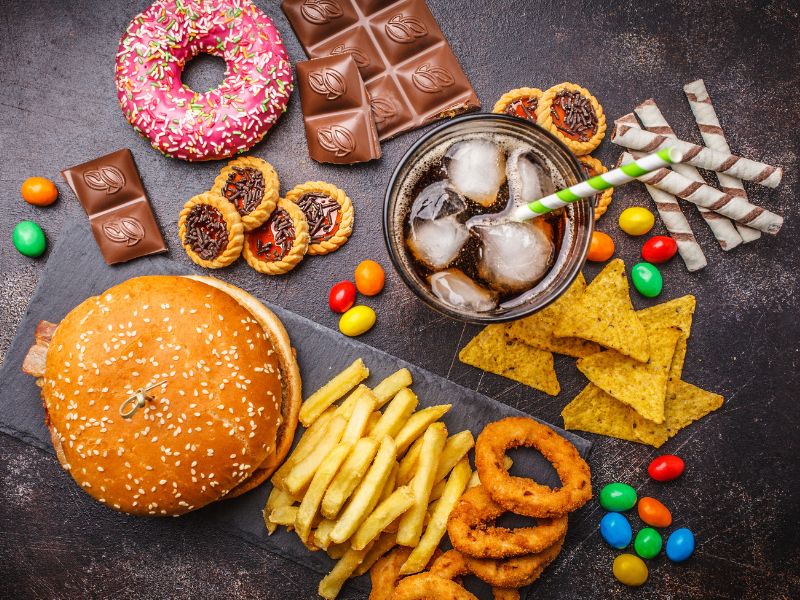July 21st marks National Junk Food Day, a lighthearted nod to our favorite snack indulgences. But beyond the fun, it’s an opportune moment to delve into the impact of ultra-processed foods (UPFs) on our health, particularly for those managing chronic conditions.
Understanding the 4 Types of Processed Foods
Not all processed foods are created equal. According to the NOVA classification system developed by public health researchers, foods fall into four categories based on how much processing they undergo:
- Unprocessed or Minimally Processed Foods
These are foods you recognize in their natural form or with slight alterations. Think fresh fruits and vegetables, plain rice, eggs, and milk. They may be washed, peeled, frozen, or vacuum-sealed—but nothing has been added. - Processed Culinary Ingredients
Items like oils, butter, sugar, and salt fall into this category. They’re extracted from whole foods and used to prepare meals, but aren’t usually consumed alone. - Processed Foods
These are foods that have been altered for preservation or flavor using salt, sugar, or oil—like canned vegetables, cheese, or freshly baked bread. They usually have a few ingredients and are recognizable as a version of the original food. - Ultra-Processed Foods (UPFs)
This is where things get dicey. UPFs are industrially formulated with ingredients not typically found in home kitchens—emulsifiers, flavor enhancers, artificial sweeteners, preservatives, and colorings. These include packaged snacks, soda, frozen meals, fast food, and many “diet” or “low-fat” convenience foods.
So while “processed” can describe everything from olive oil to toaster pastries, it’s the ultra that matters most for your long-term health. These products are designed for convenience and palatability but often lack essential nutrients.
Health Risks of Ultra-Processed Foods
When ultra-processed foods become a major part of your diet, it can take a toll on your overall health. These products are often high in added sugars, sodium, and unhealthy fats, while being low in fiber, protein, and essential nutrients your body needs to thrive.
Over time, habitual consumption of ultra-processed foods has been associated with:
- Weight gain and obesity
- Poor metabolic health, including insulin resistance
- Higher risk of cardiovascular disease
- Increased inflammation and oxidative stress
- Greater likelihood of nutrient deficiencies
Emerging research also suggests a potential link between ultra-processed diets and mental health concerns like depression and anxiety. While many of these studies are observational and can’t confirm direct causation, the pattern is clear: the more whole, nutrient-dense foods you eat, the better your body tends to function.
Impact on Chronic Conditions
For individuals managing chronic diseases, UPFs can exacerbate symptoms:
- Diabetes: High in added sugars and refined carbohydrates, UPFs can lead to blood sugar spikes, complicating glucose management.
- Asthma and Allergies: Certain additives in UPFs may trigger inflammatory responses, potentially worsening asthma and allergic reactions.
- COPD: Diets rich in UPFs are linked to increased inflammation and oxidative stress, factors that can aggravate COPD symptoms.
Are Ultra-Processed Foods Really That Bad?
While there’s a growing body of research linking ultra-processed foods (UPFs) to health risks like diabetes, heart disease, and early mortality, most of these studies are observational, not experimental. That means researchers look at large groups of people over time, track what they say they eat, and then correlate those dietary patterns with health outcomes.
But here’s the catch: people aren’t always great at remembering or accurately reporting what they eat. Plus, people who eat a lot of ultra-processed food may also have other risk factors like lower physical activity levels, higher stress, or less access to healthcare. These are called confounding variables, and they make it hard to say for sure that UPFs cause poor health, rather than simply being part of a broader picture.
So while the trend lines are pretty clear—high UPF intake is associated with worse health outcomes—the science doesn’t (yet) prove that eating a frozen pizza here and there is directly harmful. The issue is more about habitual overconsumption and displacement of nutrient-rich foods, not the occasional indulgence.
The takeaway? Use the data as a helpful guide, not a hard rule. Food isn’t just fuel—it’s culture, comfort, and convenience. And yes, you can enjoy some processed favorites in moderation while still making smart choices for your long-term health.
Moderation and Mindful Choices
While it’s unrealistic to eliminate all UPFs, moderation is key. Here are some tips:
- Read Labels: Be cautious of products with long ingredient lists and unfamiliar additives.
- Prioritize Whole Foods: Incorporate more fruits, vegetables, whole grains, and lean proteins into your diet.
- Plan Ahead: Preparing meals at home can help control ingredients and portion sizes.
At America’s Best Care Plus, we support your journey toward better health. Our services provide convenient access to essential supplies for managing chronic conditions, helping you make informed choices every day.

